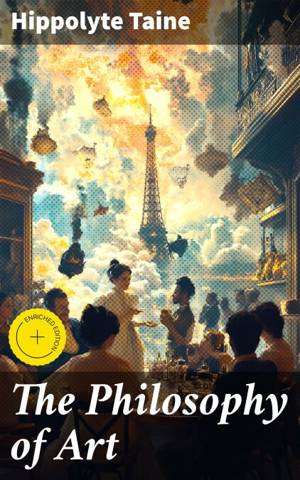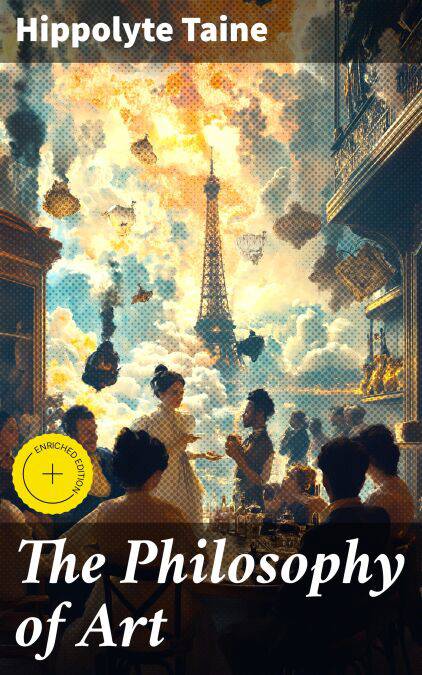
- Afhalen na 1 uur in een winkel met voorraad
- Gratis thuislevering in België vanaf € 30
- Ruim aanbod met 7 miljoen producten
- Afhalen na 1 uur in een winkel met voorraad
- Gratis thuislevering in België vanaf € 30
- Ruim aanbod met 7 miljoen producten
Zoeken
The Philosophy of Art E-BOOK
Enriched edition. Exploring the Intersection of Aesthetics and Creativity in Art Philosophy
Hippolyte Taine
E-book | Engels
€ 1,99
+ 1 punten
Uitvoering
Omschrijving
In "The Philosophy of Art," Hippolyte Taine presents a profound exploration of the intersection between art, psychology, and culture. Drawing on a range of perspectives, Taine articulates his vision of art as a reflection of the collective consciousness of a society. His literary style is marked by a meticulous analytical approach that blends clarity with a rich, evocative prose, inviting readers into a deep engagement with his themes. Contextually, the book situates itself within the 19th-century philosophical discourse, reframing aesthetic appreciation through the lenses of empiricism and historical determinism, ultimately challenging the prevailing Romantic notions of artistic expression. Hippolyte Taine (1828'Äì1893) was a prominent French philosopher and critic, whose insights were significantly shaped by his background in the sciences and history. His earlier works in literary criticism laid the groundwork for his philosophical inquiries, reflecting his belief that art is not merely an individual creation but a product influenced by external factors, including environment, race, and historical context. This framework not only illuminates Taine's motivations but also underscores the relevance of his observations in our contemporary understanding of art. Readers interested in the theoretical foundations of art, historical context, or cultural criticism will find "The Philosophy of Art" an essential addition to their libraries. Taine's incisive arguments provide a fresh lens through which to analyze artistic endeavors, making this work a vital resource for students, scholars, and anyone genuinely curious about the origins and meanings of art in society.
In this enriched edition, we have carefully created added value for your reading experience:
- A succinct Introduction situates the work's timeless appeal and themes.
- The Synopsis outlines the central plot, highlighting key developments without spoiling critical twists.
- A detailed Historical Context immerses you in the era's events and influences that shaped the writing.
- An Author Biography reveals milestones in the author's life, illuminating the personal insights behind the text.
- A thorough Analysis dissects symbols, motifs, and character arcs to unearth underlying meanings.
- Reflection questions prompt you to engage personally with the work's messages, connecting them to modern life.
- Hand‐picked Memorable Quotes shine a spotlight on moments of literary brilliance.
- Interactive footnotes clarify unusual references, historical allusions, and archaic phrases for an effortless, more informed read.
In this enriched edition, we have carefully created added value for your reading experience:
- A succinct Introduction situates the work's timeless appeal and themes.
- The Synopsis outlines the central plot, highlighting key developments without spoiling critical twists.
- A detailed Historical Context immerses you in the era's events and influences that shaped the writing.
- An Author Biography reveals milestones in the author's life, illuminating the personal insights behind the text.
- A thorough Analysis dissects symbols, motifs, and character arcs to unearth underlying meanings.
- Reflection questions prompt you to engage personally with the work's messages, connecting them to modern life.
- Hand‐picked Memorable Quotes shine a spotlight on moments of literary brilliance.
- Interactive footnotes clarify unusual references, historical allusions, and archaic phrases for an effortless, more informed read.
Specificaties
Betrokkenen
- Auteur(s):
- Vertaler(s):
- Uitgeverij:
Inhoud
- Aantal bladzijden:
- 212
- Taal:
- Engels
Eigenschappen
- Productcode (EAN):
- 4057664606082
- Verschijningsdatum:
- 26/11/2019
- Uitvoering:
- E-book
- Beveiligd met:
- Digital watermarking
- Formaat:
- ePub

Alleen bij Standaard Boekhandel
+ 1 punten op je klantenkaart van Standaard Boekhandel
Beoordelingen
We publiceren alleen reviews die voldoen aan de voorwaarden voor reviews. Bekijk onze voorwaarden voor reviews.







